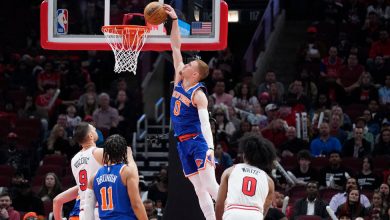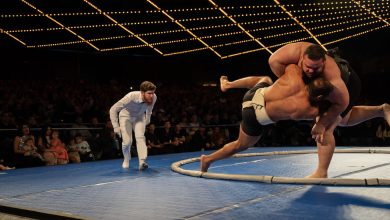Is Tennis Moving Into a New Golden Age? We Can Only Hope.

There was something for everyone. Roger Federer’s linen grace. Rafael Nadal’s punishing power. Novak Djokovic and his single-minded determination. The unwavering way Serena Williams dismantled tired tradition.
For two decades, professional tennis bathed in the golden glow provided by an unalterable hierarchy of players with distinctive styles and personalities that combined to define the game in the 21st century.
But time, and the coronavirus, changes everything.
For the second major championship in a row, as the Australian Open plays out in searing Melbourne heat, Federer and Williams find themselves at home, healing from injuries at age 40. We may never see them play top-flight tennis again.
Gone, too, of course, is Djokovic.
It’s unclear when the world No. 1 will return to major championship play, and how the scorn of fans will affect a player who has spent his career yearning for adoration. Depending on how the pandemic unfolds, tennis’s most famed vaccine refusenik could end up barred from traveling to the countries hosting the year’s biggest tournaments, imperiling his quest to break well past the 20 Grand Slam logjam he is in with Federer and Nadal.
Of the golden quartet, only Nadal made his way to Melbourne. A well-worn 35, he is coming off a foot injury that kept him out of the mix for most of last year.
He looked sharp during the Australian’s early stanza, perhaps good enough to summon greatness again and raise the championship trophy for a second time. Even if he does, how much longer can the Nadal we have known be the Nadal we revere?
What in tennis can be counted on anymore?
Nothing.
The days when the game could lean on the showstopping power of its rock star quartet to lure fans and add excitement — the days of penciling them in as locks to make at least the semifinals of every major title — those days are done.
Remember when Naomi Osaka was supposed to be the next big thing? Right now, her last major title win, the Australian Open last winter, seems in this time-warped stretch as if it occurred a decade rather than a year ago.
She left last year’s French Open midstream, using the occasion to open up about the anxiety and depression sitting heavy on her shoulders. She skipped Wimbledon, needing time away from the grind and glare. She lost early at the U.S. Open and the Tokyo Olympics. Last week, Osaka’s bid to repeat at Melbourne ended at the hands of the world’s 60th-ranked player.
Remember Emma Raducanu and Leylah Fernandez, the upstart teenagers who electrified last summer’s U.S. Open by making the women’s finals? Neither has done much since. Fernandez lost in the first round last week. Raducanu got tossed off in the second.
Maybe there’s a silver lining in the game’s newfound uncertainty. Free of the shadow cast by the biggest stars, it’s easier to gain enthusiasm for a wider cast.
During the initial week at Melbourne Park, that meant marveling at Amanda Anisimova, 20, as she ripped backhand winners past Osaka in an upset win. Or watching Carlos Alcaraz, 18, sprint, slide and stretch to keep a point alive before suddenly hauling off and smacking a full-throttle winner.
Uncertainty provided more shine to the young Italian Jannik Sinner, as stunningly gifted an upstart as there is, as he pressed his way through the draw.
It put more focus on Ashleigh Barty, last year’s Wimbledon champion, possessor of the smoothest game this side of Federer.
Will Daniil Medvedev, who crushed Djokovic’s Grand Slam dreams by beating the Serb to win the 2021 U.S. Open, wrest away the world No. 1 ranking? What happens if he becomes one of the game’s consistent standard-bearers?
In Melbourne last week, Medvedev flashed his quirky and almost unfathomable game. Several of his strokes look as if they were self-taught and honed at a craggy public park by playing with duffers — the reflex volley with one hand on the racket’s throat, the gawky forehand that sometimes ends with legs splayed and a strangulating follow-through.
As Medvedev often has at Flushing Meadows, he showed he can be an engaging champion — witty, open and more than willing to play the villain with a wink.
This year, the typically rowdy Australian Open crowd has been using Cristiano Ronaldo’s famed “Siuuu!” celebration shout during matches. That has angered several players, Medvedev included, who thought the chants were boos during his victory over Nick Kyrgios. As we might expect based on his past shenanigans at the U.S. Open, Medvedev raised hackles from the crowd when he scolded them for the chant in an on-court interview.
He later explained with his customary willingness to draw ire: “It’s not everybody who is doing it. But those who are doing it probably have a low I.Q.”
Imagine Federer saying such a thing about fans. Impossible. But maybe that’s a good and energizing change.
It is difficult to let go of a generation.
A new era has arrived. All we can do is embrace it, wait patiently, and hope for the best.



